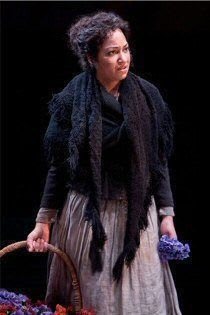Co-artistic director Greg Hersov has revived Shaw's 1912 play Pygmalion for the Royal Exchange, a play that has become Shaw's most famous through its musicalisation as My Fair Lady but which still has a place of its own in the theatrical canon.
Named after the mythical Greek sculptor who fell in love with his own statue of his ideal woman which Aphrodite then brought to life for him to marry, Shaw's famous tale has a professor of phonetics take a flower girl off the streets of London and, after six months of tuition, try to pass her off as a lady at a royal garden party for a bet. The professor, Henry Higgins, has little respect for her sex or her class, but then he treats everyone he meets more as a scientific subject than as a human being.
The story is a fascinating social experiment told through popular comedy. Two people, Eliza Doolittle and her father Alfred Doolittle, are transformed by Higgins and both suffer from it: Eliza becomes a girl with the manners of a lady who cannot go back to being a flower girl on the streets any more but she doesn't have the income of a lady, whereas Alfred complains of "middle class respectability" and the responsibilities that has brought to him. Shaw radically shows people crossing class boundaries without breeding or heritage, although both have problems in their transition as Eliza has the manners but no money and her father has the opposite.
Although Shaw was always a political writer with strong messages about class and sexual equality, he was also a very funny writer, and the comedy certainly still works with some great lines and very funny situations that have been emulated since but rarely bettered. For instance, the sketch on the Armstrong and Miller TV show where two people speak street dialect with posh accents was done much better by Shaw nearly a century ago in Eliza's first 'outing' at Henry's mother's house when she is presented to the Eynsford Hills. The way Shaw twists the outcome of this scene leaves the audience to guess at the chaos to come.
In the two leading roles, Cush Jumbo completes the transformation from the fiery, defensive street girl to the lady with better control over her emotions than her teacher perfectly, and Simon Robson gets across the cold rudeness of a man who objectifies everyone and freely admits he "treats a duchess as though she were a flower girl", but we get brief flashes of his humanity such as when Eliza is leaving him and when he flirts with Clara Eynsford Hill.
Terence Wilton is a perfect Colonel Pickering who helps to restrain Higgins's excesses of behaviour but doesn't entirely understand women himself, but then Gaye Brown's Mrs Higgins, Henry's mother, is quite formidable enough to bully him into doing as he is told. Ian Bartholomew makes the absolute most of the wonderful character of Alfred Doolittle as a frankly-spoken, working class man with strong, unswayable and perhaps not entirely informed opinions which is very funny and very familiar even today (if written now he may perhaps be portrayed as a taxi driver rather than as a dustman).
Designer Ashley Martin-Davis has kept the set simple and fairly sparse, which works well, and sound designer Peter Rice shocks the audience into giving its attention at the start with a clap of thunder and fills the gaps between scenes with a mixture of jangly piano and the sound of someone doing vocal exercises, which Eliza would have been doing between the different scenes.
While some of the excesses of Shaw's repetitive explanations and discussions are still evident, particularly towards the end, this is still a very enjoyable and worthwhile production with great performances, some big laughs and perhaps a few things for us to think about regarding class and appearance even today.
Running to 19th June, 2010
